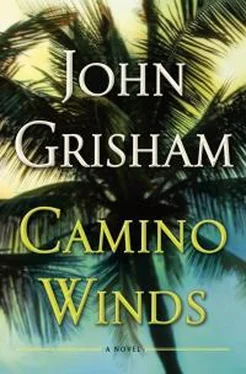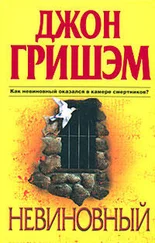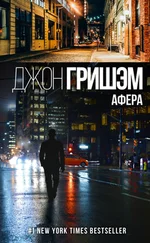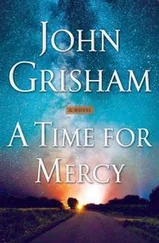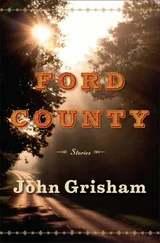“What about the Shack?”
“That’s a possibility. I don’t know if it survived but it’s on the water, the back bay.”
Butler reviewed his notes and sipped coffee. He looked at Bruce, then Bob, and asked, “And you think this gal did a number on Mr. Kerr?”
Bob grunted and said, “That’s your job, sir.”
Bruce nodded at Nick and said, “He has an interesting theory.”
“And you’re Mr. Sutton?” Butler asked.
“Nick Sutton, rising senior at Wake, summer intern here on the island where I house-sit for my grandparents. I hang around the bookstore, where Bruce pays me minimum wage to haul stock.”
“You’re overpaid,” Bruce said.
“Anyway, I live in the underbelly because I read five or six crime novels a week. As an employee I get a twenty-percent discount, even on paperbacks. At Barnes and Noble I’d get forty off. My entire paycheck, meager as it is, goes for my library.”
“Okay, and your theory?”
“She’s a professional, hired by big money to knock off Nelson because of something he has written or is writing or planning to write. He has a ‘checkered past,’ to use a badly overworked cliché. She arrived on the island with a pal, probably a man, who rented a condo near the scene, and they waited. She knew about Bob and Nelson. Easy research. She bumped into Bob, a pushover, and through him met Nelson, her prey. The hurricane presented a unique moment to strike, which she did, and then she and her pal got off the island. Or maybe they’re still around, though I doubt it.”
“Not bad,” Butler said with a smile, but it was blatantly obvious he was just humoring the kid. They can say the darnedest things. “Nice imagination.”
“Thanks. I read a lot.”
“Any ideas about a murder weapon?”
“Nelson’s golf clubs are in the garage. I’d start there.”
“Golf clubs?”
“She had to use something from the house. I doubt she showed up with a baseball bat.”
“Interesting,” Butler said, playing along. “I guess you watch a lot of movies too.”
“Not really. I’m too busy reading.”
Bruce cleared his throat and said, “Mr. Butler, I have to call Nelson Kerr’s parents and tell them something. Should I mention murder?”
“They know he’s dead, right?”
“Right, and they know about the autopsy and the involvement by the police.”
“I can’t tell you what to say, but I would tell them that he died from blunt force trauma to the head, looks suspicious, and the state police have opened an investigation.”
“Okay. And how do they get the body to California? I’ve never dealt with this before.”
“Most folks haven’t. Hire a local funeral home. They do it all the time.”
10.
Butler walked them out of the building and to the parking lot where he lit a cigarette and seemed in no hurry. As they said goodbye and shook hands, Bruce remembered something. “Nelson had just finished his latest novel, or at least an early draft. I was about to read it. The book is not under contract, so no one in New York has seen it. I’m almost certain that it’s still in his computer, and that file is pretty valuable to his estate.”
Butler nodded confidently. “We’ll secure it.”
Driving away, Nick said, “I don’t trust him. He’s cocky, smug, and not very bright. He and Hoppy will make quite a team.”
“He didn’t care for your postulating, did he?” Bob said with a laugh.
“No, he thinks I’m a nut. You see his type all the time, at least in good crime novels. These guys who’ve been around think they can look at a crime scene and name the killer. It’s called tunnel vision. They embrace their own theory, then march off in the wrong direction. They ignore facts to the contrary and embrace anything that supports their ideas. Happens all the time, especially in real-life wrongful conviction cases where they nail some poor dude while the real killer keeps on killing.”
Bruce said, “I didn’t think he was that bad.”
“He’s not too bright, Bruce,” Bob said. “Nick’s right, for a change.”
“It’s almost noon,” Nick said. “Is anybody else hungry around here?”
“Always,” Bruce said. “And thirsty. How many cold beers are left?”
“Plenty,” Nick said from the back. “Where are we going?”
“I’m tired of driving and tired of both of you,” Bruce said. “I say we go home and end this little road trip.”
“Amen,” Bob said.
Nick opened one of the coolers, passed out sandwiches and beers, and they enjoyed lunch as they sped around the Jacksonville bypass. Half an hour later they exited Interstate 95 onto the four-lane that ran twenty miles to the bridge and the island. They immediately noticed a caravan of dump trucks loaded with debris headed farther west to the county landfill. They passed a field where hundreds of FEMA trailers were parked. Eastbound traffic was heavy but moving well, at first. But after five miles it slowed, then practically stopped. Most were cars but there were dozens of trailers with backhoes, bulldozers, and loaders headed for the cleanup.
They inched along, sipping beer, listening to 1980s golden hits because they could agree on nothing else. Nick said, “Okay, you want my latest theory?”
Bruce slowly reached over and turned down the volume. He was intrigued by the deft workings of Nick’s criminal mind. Bob nodded and asked, “Are you going to tell us regardless of whether we want to hear it?”
“Yes. The real killer is the guy with the cash. Nelson published three novels about arms dealers, drug dealers, money launderers, gun runners, corporate crooks, shady defense contractors, and so on. Right, Bruce?”
“For the most part.”
“He seemed to really know his subject matter. Let’s assume he pissed off some folks along the way. If so, why would they rub him out now? The books have been published. Most have sold well. It’s all fiction, all make-believe anyway, so why get upset?”
“Your point?” Bob asked.
“My point is that what’s been said has been said, and Nelson is certainly not the first novelist to write about arms dealers. My point is that the next book, the unfinished novel, is what got him killed. Somebody out there didn’t want it published.”
Bruce and Bob nodded along.
Nick went on, “Maybe they knew his subject matter. It wouldn’t be that hard to figure out, since he always did quite a bit of research. Word got out that Nelson Kerr was writing about their business or their crimes. Or maybe they hacked him, read it, and felt threatened.”
Bruce said, “Nelson was afraid of getting hacked and worked offline. His desktop was secure. Other writers have had their stuff stolen. He was a fanatic about keeping his material protected.”
Bob asked, “How did he back up his work? The cloud?”
“Don’t know, but I doubt if he used the cloud.”
“How did he communicate?” Nick asked.
“He used a laptop for emails, but even then he never said much. He was almost paranoid. No social media at all. He changed his phone number every few months.”
“So. He was still an amateur and he could get hacked. There’s always somebody smarter. If the Russians and Chinese can hack the CIA, then our late buddy Nelson could be hacked. Wouldn’t he have sent his manuscript to his agent, maybe his editor?”
“His agent died last year and he was in the process of finding a new one. He and I talked about it at length. A month ago he told me the book was almost finished and no one had read it. He wanted me to have a look and make notes. I’ll bet the manuscript is still in his computer. Where else would it be?”
Bob said, “So after she killed him, she took his hard drive?”
“Don’t know, yet,” Nick said. “But if his hard drive is missing, then one part of the mystery is solved.”
Читать дальше
